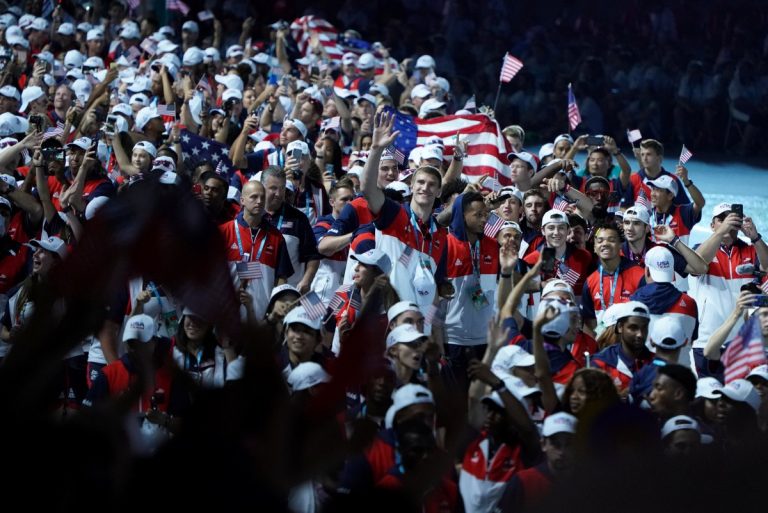
PROTESTS, rumours of suspected terror plots and a boycott from mainland China all marred the opening of the 2017 Summer Universiade (university games) in Taipei on Saturday.
The opening ceremony was temporarily disrupted by protested who blocked the student athletes from participating in the parade of nations. According to Reuters, the protestors were demonstrating against reforms in Taiwan’s pension system for government employees and teachers.

Representatives hold Colombia, China and Chile’s flags at the opening ceremony of 29th Summer Universiaden as a protest against the overhaul of the military and civil service pension funds blocks other participants from entering the venue, in Taipei, Taiwan, August 19, 2017. Source: Reuters/Eason Lam
Only those teams of nations starting with the first two letters of the alphabet were able to enter the arena before the protestors blocked the entrance.
Following this, only a single flag-bearer was allowed to enter for each of the 141 countries competing. This prevented the majority of the 7,700 student athletes from taking part in the march due to security concerns issued by the police.
Meanwhile, authorities were on high alert throughout the day after the Taipei Labour Affairs Department was tipped off by a group representing foreign workers in Taiwan that a terrorist with ties to Islamic State (IS) entered Taiwan on Friday as a foreign worker.
According to South China Morning Post, reports claiming that a foreign Taekwondo coach whose family has ties to IS was expected to arrive for the event’s opening, fuelled rumours of a possible terror attack on the island.
Central News Agency also reported that the authorities were investigating reports that an Indonesian maid working in Taiwan had expressed sympathy with IS on social media.
Last night’s Opening Ceremony was one to remember. #Fireworks #SUTaipei2017 #Universiade #FISU
(Photos: TUOC) pic.twitter.com/nHt8tY9bWb
— #FISU #SUTaipei2017 (@FISUnetwork) August 20, 2017
On top of this, the games have been plagued by tensions with Beijing and Taiwan’s struggle for international recognition. The two sides split after a civil war in 1949, but Beijing still sees the island as part of its territory and objects to any official diplomatic recognition of Taiwan.
Despite the games being held on Taiwan soil, the self-ruled island must compete as “Chinese Taipei” and is unable to fly its national flag or play its national anthem because of Beijing’s sensitivities.
At the opening event, Taiwan President Tsai Ing-wen was introduced as the president of “the Republic of China”, Taiwan’s official name, which China does not recognise. She waved to the audiences but did not give a speech.

Pro-China supporters wave the Chinese flag before the opening of the 29th Summer Universiade, in Taipei, Taiwan August 19, 2017. Source: Reuters/Eason Lam
As a form of protest, the Chinese students boycotted the opening ceremony.
According to AFP, the boycott was in response to Tsai being referred to as Taiwan’s president.
Taipei’s mayor Ko Wen-je said he had not accepted demands from Chinese officials for Tsai only to be called “leader” at the opening ceremony, not “president”.
Despite skipping out on the ceremony, Chinese students will compete in individual events but sit out the team sports, citing a clash with their own national games.
The opening was marred by more than four rounds of protests and scuffles outside the stadium by hundreds of protesters, including those supporting either Taiwan independence or unification with the mainland.
More than 5,600 uniformed and plain clothes police were on duty, according to SCMP. Military police carrying rifles were seen patrolling near the Taipei stadium.
**This article first appeared on our sister site Asian Correspondent
Liked this? Then you’ll love these…
Taiwan: Sports-themed train promotes summer university games in Taipei







